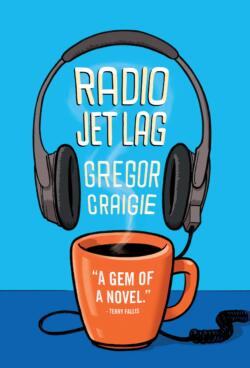1878 Satiric comedy with ‘relevant themes and a compelling plot’
Radio Jet Lag
By Gregor Craigie
Toronto: Cormorant Books, 2023
$24.95 / 9781770866713
Reviewed by Ginny Ratsoy
*
 Radio Jet Lag, a lightly satiric comic novel, is at once a paean to the city of Victoria, a detailed account of the fast-paced world of radio broadcasting, a portrait of the trials and tribulations of contemporary fatherhood, and a critique of political responses to homelessness.
Radio Jet Lag, a lightly satiric comic novel, is at once a paean to the city of Victoria, a detailed account of the fast-paced world of radio broadcasting, a portrait of the trials and tribulations of contemporary fatherhood, and a critique of political responses to homelessness.
In his debut novel Victoria’s Gregor Craigie successfully adapts the classic realist pattern, complete with a sympathetic yet flawed hero caught between practicality and idealism, to a contemporary Canadian urban setting and episodic structure: the novel is set in a 1.5 year time frame in the mid-2010s, with chapters spaced 2-4 months apart. The sleep-walking-through-life experiences of protagonist Stephen Millburn, as he navigates a new city and a new position at radio station CIFU after night after night of co-parenting colic-plagued tot Noah, also make for the best type of humour–that infused with seriousness and grounded in real-life issues. Stephen is a relatable contemporary Everyman.
Stephen and his wife Carole (a lawyer who has put a temporary hold on her career to assume primary parenting) have relinquished stability by making the move from secure positions in Ottawa to start over in the city of their dreams. Craigie dots our hero’s daily journey with local landmarks–from McPherson Playhouse, Munro’s Books, and the Gate of Harmonious Interest to his local Tim Horton’s pit-stop in Rock Bay and the University of Victoria. From sun visor- and poncho-clad tourists to hipsters in denim, there’s local colour too. The city is more than a backdrop, though: on one hand, its landscape and symbols nurture and inspire Stephen; on the other, Craigie draws on Victoria’s seamier side for important plot development–specifically, the controversy over government responses to the 2015-2016 homeless encampment on the lawn of the BC Legislature, which Craigie himself covered as a broadcast journalist.

Yes, Craigie knows of what he writes, capturing the unconventional hours, frantic pace, and unusual demands of contemporary broadcasting. Millburn’s early-morning time slot pains him: shift work disorder is a reality; it can impair concentration and cause mood swings and insomnia, and Millburn, despite over-caffeination, falls asleep on the job more than once, eventually resorting to clandestine napping. Multitasking is the order of the day: Millburn is often broadcasting from a script he’s not previously read or alternating between two sets of headphones (one connected to the laptop with the interviews he is editing and the other connected to the live broadcast). In addition, he must feign instant expertise on everything from sewage treatment to the Stephen Harper government and e-cigarettes, make public appearances, and contend with his hyper-capitalist station owner George Caulfeild’s obsession with ratings and pacifying a motley crew of advertisers (of everything from orthotics to reverse mortgages). Above all, Caufeild’s increasingly vociferous objections to his insistent interviewing of homeless people rankle–and drive the plot.
On the home front, the single-bread-winner, single-care-giver model becomes increasingly precarious. Compartmentalizing parental roles proves inadvisable–indeed, impossible. Carole needs outside social and intellectual stimulation, and Stephen cannot relinquish all paternal duties. Noah’s sleeplessness fuels his father’s insomnia, and when Carole gives birth to twins, the family, clearly outgrowing their rental apartment, must, on one income, assume a mortgage of daunting proportions. Family visitors and Millburn’s brief parental leave provide welcome respite for the caregivers, but both are temporary solutions.
As work-life balance continues to elude him, doubt creeps into Millburn’s consciousness: why did he give up the safety of Ottawa for the insecurities of this new city? The idealistic origins of his attraction to broadcast journalism grow hazy.
Millburn’s rational side tells him to ride it out on the home front and play it safe at the job: CIFU’s ratings have climbed since he came on board, and if he sticks to the script, so to speak, his professional future could brighten. However, his idealistic side wins out: on the eve before Christmas Eve, inspired by the statue of Terry Fox at the foot of Douglas Street, he finds himself returning to the inhabitants of the homeless encampment in an effort to get beyond government-speak.
All along, he has been driven by the conviction that crucial details are missing from the “official” story: the homeless themselves must tell their stories. The result is a truly heartbreaking revelation that he finds the courage to air, despite his boss’s objections. The tightrope Millburn has walked he can walk no more, and a fall seems inevitable. That evening, he leaves the station, dejected, and heads for a public appearance in an Anglican Church across from the now-dismantled encampment. When the spiritual setting evokes memories of his father’s heart failure at an eerily similar service decades earlier, Stephen’s own spirit breaks, but the setting buoys him through his performance, a reading from the Book of Luke In true comedic fashion, we learn that (with the help of a like-minded colleague) Stephen may be saved: practically, spiritually, and idealistically. With a denouement that leaves both Stephen and the reader up in the air, Radio Jet Lag cries out for a sequel.
With a sympathetic protagonist, relevant themes, and a compelling plot underpinning its light tone, Radio Jet Lag is an auspicious fictional outing. It is a natural candidate for Victoria Reads, if the capital city holds such an event. Radio Jet Lag is in a comic vein not unlike recent work by fellow Canadians Terry Fallis (whose praise for the novel graces both of its covers) and Randy Boyagoda (the protagonist of Original Prin comes to mind). Come to think of it, both Fallis and Boyagoda created protagonists that have been successfully sequel-ized. We are a country with a rich comic tradition (we have, after all, had a medal for humour since 1947), and Craigie is a welcome new addition to the canon.
*
 Ginny Ratsoy is Professor Emerita at Thompson Rivers University, where she created and taught a course on humour in Canadian literature. Her scholarly publications (co-authored and edited and co-edited books and numerous peer-reviewed articles) have focused on Canadian fiction, theatre, small cities, third-age learning, and the scholarship of teaching and learning. In addition to counteracting ageism by maintaining a growth mindset through activism, freelance writing and community engagement, she promotes later-life learning through her involvement as a board member, coordinator, and instructor for the Kamloops Adult Learners Society. Editor’s note: Ginny Ratsoy has recently reviewed books by Iona Whishaw, Elizabeth Bass, Karen L. Abrahamson, & J.E. Barnard (eds.), Gregor Craigie & Kathleen Fu, Cynthia Flood, Reed Stirling, Maria Tippett, and Gillian Ranson for The British Columbia Review.
Ginny Ratsoy is Professor Emerita at Thompson Rivers University, where she created and taught a course on humour in Canadian literature. Her scholarly publications (co-authored and edited and co-edited books and numerous peer-reviewed articles) have focused on Canadian fiction, theatre, small cities, third-age learning, and the scholarship of teaching and learning. In addition to counteracting ageism by maintaining a growth mindset through activism, freelance writing and community engagement, she promotes later-life learning through her involvement as a board member, coordinator, and instructor for the Kamloops Adult Learners Society. Editor’s note: Ginny Ratsoy has recently reviewed books by Iona Whishaw, Elizabeth Bass, Karen L. Abrahamson, & J.E. Barnard (eds.), Gregor Craigie & Kathleen Fu, Cynthia Flood, Reed Stirling, Maria Tippett, and Gillian Ranson for The British Columbia Review.
*
The British Columbia Review
Interim Editors, 2023-24: Trevor Marc Hughes (non-fiction), Brett Josef Grubisic (fiction)
Publisher: Richard Mackie
Formerly The Ormsby Review, The British Columbia Review is an on-line book review and journal service for BC writers and readers. The Advisory Board now consists of Jean Barman, Wade Davis, Robin Fisher, Barry Gough, Hugh Johnston, Kathy Mezei, Patricia Roy, Maria Tippett, and Graeme Wynn. Provincial Government Patron (since September 2018): Creative BC. Honorary Patron: Yosef Wosk. Scholarly Patron: SFU Graduate Liberal Studies. The British Columbia Review was founded in 2016 by Richard Mackie and Alan Twigg.
“Only connect.” – E.M. Forster
5 comments on “1878 Satiric comedy with ‘relevant themes and a compelling plot’”